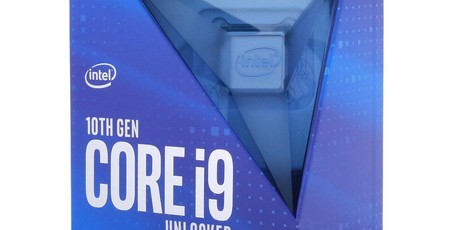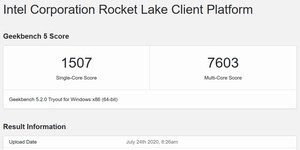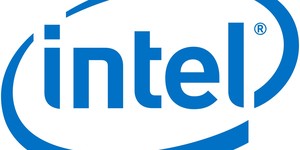
Overclocking
The Core i9-10900K runs at an all-core 4.8GHz under load, opportunistically boosting to 4.9GHz if temperature is sufficiently low enough. That's already a high bar for 14nm silicon, so even by manually inputting 1.35V we only managed to raise the all-core speed to 5.1GHz. That tells us that most users are best advised to leave overclocking alone; it's not worth it.
However, the Cinebench nT score went up from 6,341 to 6,566, Blender's time dropped from 402 seconds to 380 seconds, while running Shadow of the Tomb Raider at FHD saw average/minimum framerates inch up from 161/129fps to 163/132fps. Marginal gains in the big scheme of things, particularly as power consumption increases by 34W and temperature rises from 74°C to 81°C on a premier Noctua cooler.
Performance Analysis
As expected, performance is excellent in gaming, eclipsing the leading scores laid down by Core i9-9900K. Consistently running at over 5GHz is a boon for light-load applications, too. Matters are not so rosy when all-core muscle is required, because even though it is faster than any mainstream Intel processor that has come before, the Ryzen 9 duo is quicker still. That's not too bad if comparing against the 3950X, which is dearer, but the problem lies with the 3900X. That AMD chip is faster in tasks such as Blender and Cinebench, appreciably so, and it is cheaper.
Intel's use of two more cores and four more threads than the last generation pays dividends in every scenario. The problem is that AMD has moved the performance needle plenty in the time Intel has been moving between 8th, 9th and 10th Gen chips.

Conclusion
Intel knows that it doesn't have the technology arsenal to really move the performance of its 10th Gen processors enough to topple rival AMD from its mainstream perch. The chip giant does what it can be increasing the core-and-thread count for the i9 chips to 10 and 20, respectively, and along with elevated frequencies, enables top-tier gaming performance and solid multithreading.
Benchmark numbers paint a positive picture compared to 9th Gen - the 10900K is about the same price as the soon-to-be-retired 9900K - but one problem users will have to financially surmount is the need to also purchase a new motherboard. Most likely a Z490 costing at least £150, you need to factor that into the buying decision.
Power is higher than we'd like, primarily because the chip is running somewhat out of spec on Z490 boards with the latest performance BIOSes, so be sure to have a capable cooler if contemplating Core i9-10900K.
Overall, then, the Core i9-10900K is a solid processor that is the best Intel can do for now. Users wanting more multitasking muscle ought to look at AMD Ryzen 9 instead, but for gamers with cash to spare, Intel remains the premier choice.


MSI MPG Velox 100R Chassis Review
October 14 2021 | 15:04








Want to comment? Please log in.